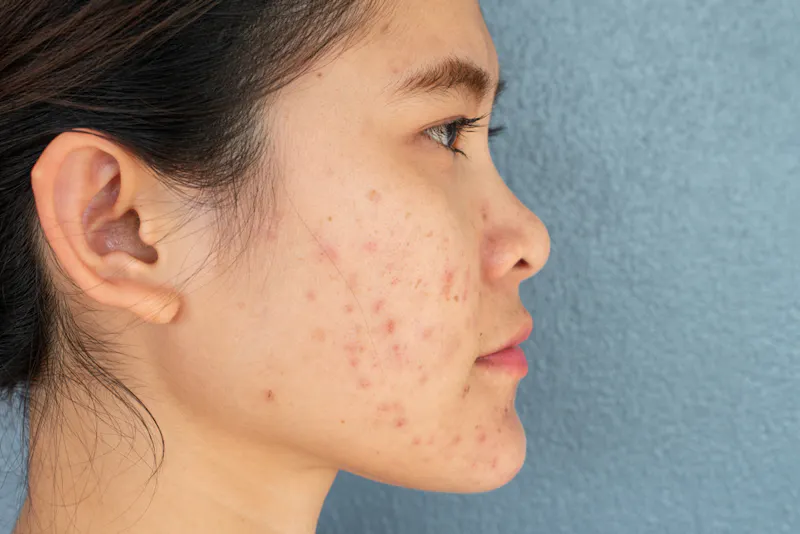How do hormones affect your skin?
What's covered?



Changes to your skin can be frustrating and hard to understand. Your hormones can have a big impact on your skin — at any age. Here’s why.
What is hormonal acne?
Acne is one of the most common skin problems in the UK — and it can happen at any age. It’s estimated that about 5% of women and 1% of men over 25 suffer from acne. Forms of hormonal acne include:
- pimples
- blackheads
- whiteheads
- cysts
What causes hormonal acne?
Most acne is caused by excess oil production, which clogs the pores in your skin. And your hormones can have a big effect on how much oil you produce. Hormonal acne can be driven by hormonal changes from:
- menstruation
- polycystic ovary syndrome (PCOS)
- menopause
- high testosterone levels
In teenagers, hormonal acne tends to occur on your forehead, nose, and chin. In adults, hormonal acne tends to occur on your cheeks and jawline.
How hormones affect your skin
Your skin is covered in small glands called sebaceous glands — these secrete an essential oil called sebum which helps keeps your skin healthy. These glands have receptors that respond to your hormones, including oestrogen and testosterone.
Sebaceous glands are very sensitive to androgens like testosterone. The more androgens in your blood, the more they bind to your sebaceous glands — causing you to produce more oil.
Both males and females produce androgens, especially during puberty — which is what can cause oily skin during this time.
Oestrogen is also thought to affect the amount of sebum you produce but more research is needed on this. At very high doses, oestrogen stops oil production. Oestrogen also:
- increases collagen production and keeps your skin thick
- helps hydrate your skin
- supports wound healing
How your monthly cycle affects your skin
It’s very common for women to experience acne — especially the week before your period starts. This is because your oestrogen levels are dropping. These outbreaks will usually clear up after your period starts and your oestrogen levels increase.
It’s still not completely clear why lower oestrogen levels cause this but it could be because:
- of the balance between your oestrogen and progesterone levels during this phase in your cycle
- you don’t have enough oestrogen to stop your glands from producing too much oil so your pores become clogged
Dermatologists will normally advise hormonal testing for women who have acne along with other symptoms that could indicate PCOS — like irregular periods and excessive body hair.
How menopause affects your skin
As you transition into menopause your hormone levels drop — leading to changes in your skin. You might start to experience:
- dry or itchy skin — due to dropping oestrogen levels
- acne — due to dropping oestrogen levels and increasing testosterone levels
- sagging and wrinkling — due to dropping oestrogen and collagen levels
Other things that can affect your skin
Genetics and skin
Acne has been found to be highly hereditary. So if you have a family history of skin issues you’re more likely to have skin problems.
Diet and skin
Eating lots of foods with a high glycemic index (high-GI) has been linked to acne. This is because high-GI foods food can affect your hormones. High-GI foods include white bread, cookies, cakes, and pizza.
The link between dairy and acne is weak but possible. So it’s important to monitor your own symptoms and see if dairy aggravates your skin. Keeping a food diary is a good idea.
Stress and skin
When you’re stressed your body produces more cortisol — a stress hormone. High levels of cortisol can cause inflammation and occasionally cause inflammatory skin conditions like psoriasis.
Sleep and skin
If you don’t get enough sleep your body produces more cortisol — leading to inflammation.
Treating hormonal acne naturally
In addition to getting enough sleep and lowering your stress levels, there are some other things that can promote good skin.
Diet
Diets rich in fruit and vegetables are really good for your skin. It’s also important to make sure you’re getting enough omega-3 fats (like oily fish) — to reduce inflammation and help keep your skin clearer.
Supplements
Some people find that omega-3 supplements or zinc supplements help reduce acne.
Exercise
Exercise helps to regulate your hormones and also reduces stress. Aim for 30 minutes of exercise five times a week.
Tea tree oil
Tea tree oil can help reduce inflammation and kill bacteria. You can find tea tree oil in skin care products or you can use tea tree essential oil — make sure to dilute this before using.
Alpha hydroxy acids
Alpha hydroxy acids (AHAs) helps remove dead skin cells which stops your pores from clogging. Make sure to wear a broad-spectrum sunscreen if using AHAs as they make your skin more sensitive to the sun.
Treating hormonal acne with your GP
The first step to treating hormonal acne is to understand what's causing a change in your hormone levels. A blood test might be done to check your hormone levels. Once you know the underlying cause, your GP or dermatologist will work with you to figure out the best treatment.
Combined oral contraceptive pill
The combined oral contraceptive pill can help clear acne, especially if your acne tends to flare up around your period or if you have PCOS. A blood test
Topical treatments
There are a number of topical gels or creams that can be used to help treat acne. The most common ones include:
- retinoids — a vitamin A derivative that removes dead skin cells. Make sure to wear a broad-spectrum sunscreen when using retinoids as they make your skin more sensitive to the sun.
- benzoyl peroxide — an antiseptic that removes bacteria on your skin
- antibiotics — removes bacteria on your skin
- azelaic acid — removes dead skin cells and bacteria
Oral antibiotics
Antibiotic tablets, like tetracycline, are sometimes used to treat acne. These make your skin more sensitive to the sun so you need to wear a broad-spectrum sunscreen. They can also affect the oral contraceptive pill so you should use an alternative method of contraception. If you’re pregnant or breastfeeding, erythromycin is usually used.
Isotretinoin
If your acne is severe you might be prescribed isotretinoin. But this drug can also have a lot of side effects so it’s really important to work closely with your doctor and dermatologist if you're taking this.
Hormone replacement therapy
Hormone replacement therapy (HRT) might help ease menopausal skin symptoms like acne. This is because it can help replace the oestrogen and progesterone your body loses. But sometimes taking these hormones can cause acne.
American Academy of Dermatology (2013). Growing evidence suggests possible link between diet and acne. Retrieved 14 November 2018 from https://www.aad.org/media/news-releases/growing-evidence-suggests-possible-link-between-diet-and-acne.
Farage, M. A., Neill, S., & MacLean, A. B. (2009). Physiological changes associated with the menstrual cycle: A review. Obstetrical & Gynecological survey, 64(1), 58-72.
Hall, G., & Phillips, T. J. (2005). Estrogen and skin: The effects of estrogen, menopause, and hormone replacement therapy on the skin. Journal of the American Academy of Dermatology, 53(4), 555-568.
National Health Services (2016). Treatment: Acne. Retrieved 14 November 2018 from https://www.nhs.uk/conditions/acne/treatment/.
Suggs, A., Loesch, M., Ezaldein, H., Christensen, L., Dawes, D., & Baron, E. (2018). An Acne Survey from the World's Largest Annual Gathering of Twins. Journal of Drugs in Dermatology: JDD, 17(4), 380-382.